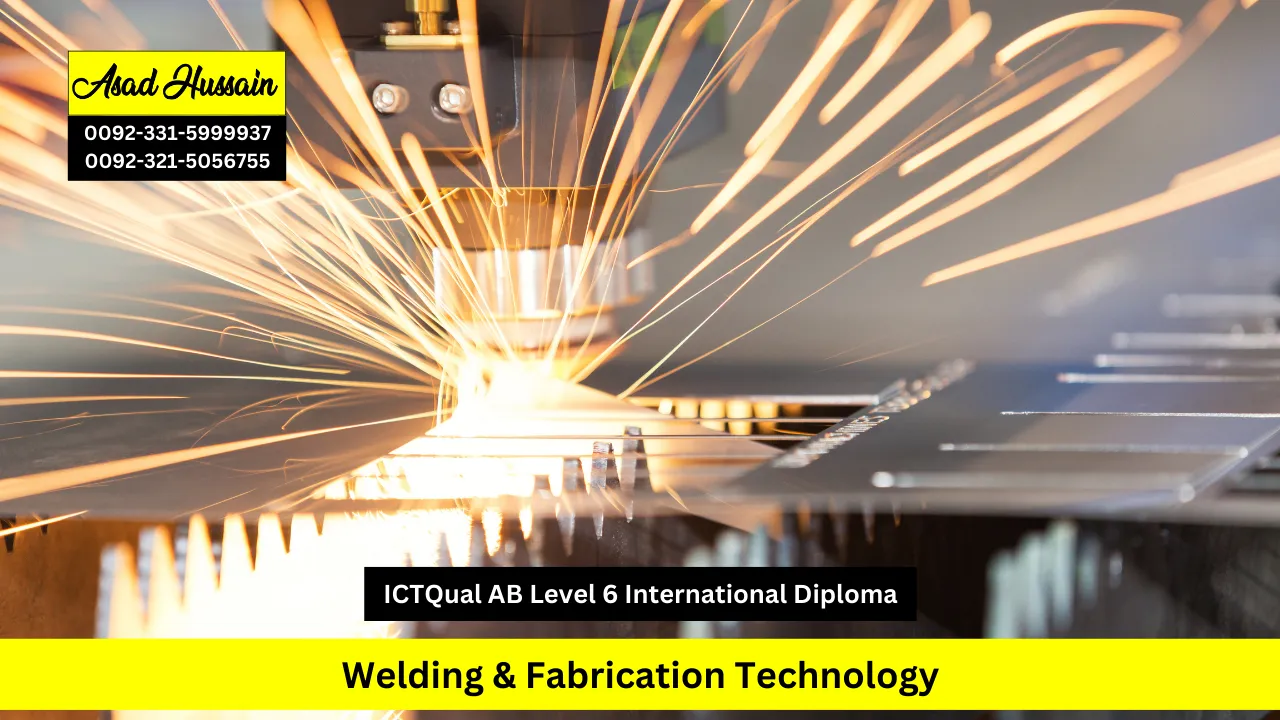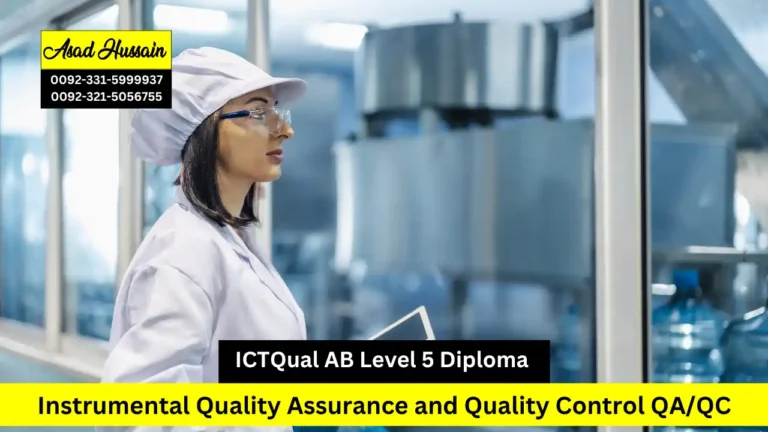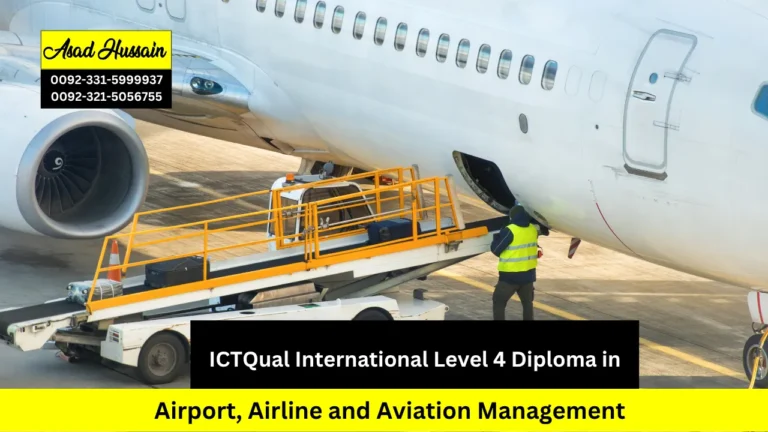Welding and fabrication technology are critical components of modern engineering, construction, and manufacturing industries. The ICTQual AB Level 6 International Diploma in Welding & Fabrication Technology equips learners with advanced technical knowledge, practical skills, and professional competencies necessary for careers in industrial fabrication, structural engineering, and metallurgical applications.
ICTQual ABLevel 6 International Diploma in Welding & Fabrication Technology covers welding processes, metallurgy, fabrication techniques, design principles, quality control, and safety standards. Learners gain hands-on experience in various welding methods, including MIG, TIG, and arc welding, along with advanced fabrication processes, reading technical drawings, and operating industry-standard machinery.
The ICTQual ABLevel 6 International Diploma in Welding & Fabrication Technology emphasizes practical applications through workshops, laboratory exercises, and project-based learning, enabling learners to solve real-world fabrication challenges, optimize production processes, and ensure structural integrity and compliance with industry standards. Graduates are prepared to work confidently in manufacturing plants, construction sites, engineering workshops, and industrial maintenance roles.
Upon successful completion, learners receive a British Council verifiable, MOFA and Embassy attestable certification, recognized internationally. ICTQual ABLevel 6 International Diploma in Welding & Fabrication Technology enhances professional credibility, employability, and career advancement opportunities in welding, fabrication, and related engineering sectors.
Program Highlights
Study Units
Year 1 – Foundation in Welding & Fabrication
- Introduction to Welding and Fabrication Technology
- Engineering Materials and Metallurgy
- Workshop Safety and Health Practices
- Basic Welding Techniques and Processes
- Metal Cutting and Shaping Methods
- Technical Drawing and Blueprint Interpretation
- Measurement and Quality Control in Fabrication
- Introduction to Welding Equipment and Tools
- Welding Metallurgy and Defects
- Fundamentals of Fabrication Design
- Industrial Mathematics for Fabrication
- Communication and Professional Skills
Year 2 – Intermediate Welding & Fabrication
- Advanced Welding Processes
- Gas Welding and Cutting Techniques
- Arc Welding and TIG/MIG Methods
- Welding Inspection and Testing
- Structural Fabrication Principles
- Sheet Metal Fabrication Techniques
- Welding Codes, Standards, and Regulations
- Welding Project Planning and Management
- Welding Metallurgy – Advanced Concepts
- Fabrication Automation and Machinery
- Health, Safety, and Risk Management in Welding
- Problem-Solving and Technical Decision Making
Year 3 – Advanced Welding & Fabrication
- Fabrication Design and Project Execution
- Advanced Structural Welding Techniques
- Pipe and Pressure Vessel Welding
- Welding Metallurgy – Failure Analysis
- Robotic Welding and Automation Technology
- Quality Assurance and Industry Standards
- Welding Project Management and Leadership
- Advanced Fabrication for Construction and Industry
- Cost Estimation and Resource Planning
- Research and Innovation in Welding Technology
- Capstone Project in Welding & Fabrication
- Professional Development and Career Planning
To ensure learners are fully prepared for the Level 6 diploma, the ICTQual AB Level 6 International Diploma in Welding & Fabrication Technology has specific entry requirements covering age, education, professional experience, and language proficiency.
Age Requirements
- Candidates must be 18 years or older at the time of enrollment.
- Mature learners with relevant practical experience in fabrication or engineering may also be considered.
Educational Requirements
- Completion of a Level 5 Diploma or equivalent in Welding Technology, Fabrication, Mechanical Engineering, or a related field.
- Applicants with a bachelor’s degree in Mechanical, Industrial, or Manufacturing Engineering are eligible.
Professional Experience
- Minimum 1–2 years of hands-on experience in welding, fabrication, or industrial engineering roles is recommended.
- Practical exposure to welding techniques, metallurgical processes, or fabrication projects is advantageous.
English Language Proficiency
- Demonstrated proficiency in English equivalent to IELTS 5.5 or higher.
- Ability to understand technical terminology, follow instructions, and engage in academic and practical learning is essential.
The ICTQual AB Level 6 International Diploma in Welding & Fabrication is designed to provide learners with advanced knowledge, practical skills, and leadership capabilities in welding, fabrication, and metalworking industries. The ICTQual AB Level 6 International Diploma in Welding & Fabrication Technology emphasizes technical expertise, quality control, safety standards, and innovative approaches to fabrication projects, preparing learners for professional roles in industrial, construction, and manufacturing sectors.
Year 1 – Foundation in Welding & Fabrication
Introduction to Welding and Fabrication Technology
- Understand basic principles, types, and applications of welding and fabrication.
- Apply foundational techniques to simple welding and fabrication tasks.
- Evaluate welding operations using measurable quality and safety standards.
Engineering Materials and Metallurgy
- Identify properties and behaviors of metals used in welding and fabrication.
- Apply metallurgical principles to material selection and process planning.
- Assess material performance using measurable criteria.
Workshop Safety and Health Practices
- Understand occupational hazards in welding and fabrication environments.
- Implement safety protocols and protective measures.
- Monitor safety compliance using measurable indicators.
Basic Welding Techniques and Processes
- Apply manual welding techniques including SMAW, GMAW, and oxy-acetylene welding.
- Demonstrate proficiency in basic welding joints and configurations.
- Assess weld quality against measurable industry standards.
Metal Cutting and Shaping Methods
- Apply mechanical and thermal cutting techniques safely.
- Demonstrate skills in shaping metals for fabrication tasks.
- Evaluate cutting accuracy using measurable performance benchmarks.
Technical Drawing and Blueprint Interpretation
- Interpret technical drawings and fabrication blueprints accurately.
- Apply drawing information to plan welding and fabrication projects.
- Assess blueprint accuracy and project alignment using measurable criteria.
Measurement and Quality Control in Fabrication
- Use precision measuring tools to ensure fabrication accuracy.
- Apply quality control techniques to welding and fabrication tasks.
- Evaluate results using measurable standards of conformity.
Introduction to Welding Equipment and Tools
- Identify and operate common welding and fabrication equipment.
- Apply proper setup and maintenance procedures.
- Assess equipment performance using measurable operational standards.
Welding Metallurgy and Defects
- Understand common welding defects and metallurgical issues.
- Apply corrective techniques to prevent welding failures.
- Evaluate weld integrity using measurable inspection standards.
Fundamentals of Fabrication Design
- Develop basic fabrication designs for practical applications.
- Apply design principles to metal structures and components.
- Assess design feasibility using measurable engineering standards.
Industrial Mathematics for Fabrication
- Apply mathematical principles to welding and fabrication calculations.
- Use measurement, scaling, and estimation in fabrication tasks.
- Evaluate accuracy of calculations against measurable outcomes.
Communication and Professional Skills
- Develop effective technical communication and reporting skills.
- Apply teamwork and professional conduct in fabrication projects.
- Assess communication effectiveness using measurable performance indicators.
Year 2 – Intermediate Welding & Fabrication
Advanced Welding Processes
- Apply advanced welding techniques including TIG, MIG, and flux-cored processes.
- Optimize welding parameters for different materials.
- Evaluate weld quality using measurable technical standards.
Gas Welding and Cutting Techniques
- Apply oxy-fuel welding and cutting methods effectively.
- Demonstrate safety and efficiency in gas-based operations.
- Assess outcomes using measurable accuracy and quality standards.
Arc Welding and TIG/MIG Methods
- Execute complex welding tasks with advanced arc and gas techniques.
- Apply appropriate methods for structural and industrial applications.
- Evaluate weld integrity using measurable inspection criteria.
Welding Inspection and Testing
- Conduct non-destructive testing (NDT) and inspection of welds.
- Apply testing methods to identify defects and improve quality.
- Assess weld quality against measurable industry benchmarks.
Structural Fabrication Principles
- Apply fabrication methods to structural steel and metal frameworks.
- Demonstrate knowledge of load-bearing and design considerations.
- Evaluate structural integrity using measurable performance indicators.
Sheet Metal Fabrication Techniques
- Execute forming, bending, and joining operations on sheet metals.
- Apply fabrication techniques for industrial and commercial applications.
- Assess fabrication accuracy using measurable standards.
Welding Codes, Standards, and Regulations
- Understand ISO, ASME, and other welding and fabrication standards.
- Apply codes to ensure regulatory compliance in projects.
- Evaluate compliance using measurable verification procedures.
Welding Project Planning and Management
- Plan, schedule, and manage welding and fabrication projects.
- Apply resource allocation and workflow optimization techniques.
- Assess project efficiency using measurable performance criteria.
Welding Metallurgy – Advanced Concepts
- Analyze metallurgical properties and behaviors of welded joints.
- Apply corrective measures to prevent failures.
- Evaluate metallurgical performance using measurable standards.
Fabrication Automation and Machinery
- Operate automated fabrication machinery safely and efficiently.
- Integrate automated processes for industrial-scale production.
- Evaluate automation performance using measurable criteria.
Health, Safety, and Risk Management in Welding
- Implement advanced safety and risk management protocols.
- Apply emergency preparedness and hazard control strategies.
- Assess safety performance using measurable indicators.
Problem-Solving and Technical Decision Making
- Apply analytical skills to solve complex welding and fabrication challenges.
- Make data-driven decisions in operational and project contexts.
- Evaluate solutions against measurable technical and operational standards.
Year 3 – Advanced Welding & Fabrication
Fabrication Design and Project Execution
- Develop and execute advanced fabrication designs and projects.
- Apply project management techniques for successful implementation.
- Evaluate project outcomes using measurable engineering and operational metrics.
Advanced Structural Welding Techniques
- Apply advanced welding for heavy structures, frames, and industrial applications.
- Demonstrate expertise in multi-pass welding and complex joints.
- Assess structural weld quality using measurable inspection standards.
Pipe and Pressure Vessel Welding
- Execute welding techniques specific to piping and pressure vessels.
- Apply standards for high-pressure and critical applications.
- Evaluate weld integrity using measurable testing criteria.
Welding Metallurgy – Failure Analysis
- Conduct failure analysis and root-cause investigation on welded structures.
- Apply corrective strategies to prevent future defects.
- Assess corrective measures using measurable engineering outcomes.
Robotic Welding and Automation Technology
- Operate robotic welding systems in industrial settings.
- Apply automation for precision, efficiency, and consistency.
- Evaluate robotic performance using measurable standards.
Quality Assurance and Industry Standards
- Implement QA procedures and inspections across fabrication projects.
- Ensure compliance with ISO, ASME, and industry standards.
- Assess QA outcomes using measurable benchmarks.
Welding Project Management and Leadership
- Lead welding and fabrication teams effectively.
- Apply project planning, scheduling, and monitoring techniques.
- Evaluate team performance using measurable project management standards.
Advanced Fabrication for Construction and Industry
- Execute complex fabrication projects for industrial and construction applications.
- Apply advanced techniques for structural integrity and efficiency.
- Assess fabrication performance using measurable criteria.
Cost Estimation and Resource Planning
- Calculate project costs and allocate resources efficiently.
- Apply financial and operational planning for fabrication projects.
- Evaluate cost-effectiveness using measurable standards.
Research and Innovation in Welding Technology
- Conduct applied research to improve welding methods and processes.
- Apply innovative approaches for industrial and commercial challenges.
- Evaluate research outcomes using measurable technical criteria.
Capstone Project in Welding & Fabrication
- Integrate knowledge and skills from all units into a comprehensive project.
- Apply engineering, safety, and management principles in real-world scenarios.
- Assess project success using measurable operational and academic standards.
Professional Development and Career Planning
- Develop career planning strategies in welding and fabrication industries.
- Apply professional ethics, lifelong learning, and leadership principles.
- Evaluate career readiness using measurable standards.
Upon completion, learners will possess advanced technical expertise, practical skills, and leadership capabilities to excel in welding and fabrication industries, manage complex projects, and implement innovative solutions in industrial, manufacturing, and construction contexts.
The ICTQual AB Level 6 International Diploma in Welding & Fabrication Technology is suitable for learners seeking to advance technical skills, leadership abilities, and professional expertise in welding, fabrication, and industrial engineering. The ICTQual ABLevel 6 International Diploma in Welding & Fabrication Technology caters to a wide spectrum of learners aiming to improve employability, career progression, and practical competency.
1. Educational Instructors and Trainers
- Enhance teaching capabilities by integrating advanced welding and fabrication techniques into training programs.
- Stay updated on industry standards, safety protocols, and emerging technologies to provide high-quality instruction.
2. Environmental Advocates and Activists
- Promote sustainable practices and environmentally responsible fabrication methods.
- Advocate for safe disposal of materials, energy-efficient production, and reduced industrial waste.
3. Students and Recent Graduates
- Gain practical skills and technical knowledge to enter welding, fabrication, and industrial engineering roles confidently.
- Acquire hands-on experience and industry-recognized credentials to improve employability.
4. Career Changers
- Transition from other industries into welding, fabrication, or industrial engineering careers.
- Develop specialized skills, international certification, and practical experience for a credible career change.
5. Policy Makers and Regulators
- Understand welding and fabrication processes, safety standards, and quality management to inform regulations and policies.
- Ensure industry compliance with national and international safety and environmental standards.
ICTQual ABLevel 6 International Diploma in Welding & Fabrication Technology is ideal for learners committed to professional growth, technical excellence, and leadership in welding and fabrication. By catering to educators, students, career changers, environmental advocates, and policy makers, the ICTQual AB Level 6 International Diploma in Welding & Fabrication Technology prepares graduates to excel in industrial, construction, and engineering sectors while upholding safety, quality, and ethical standards.







